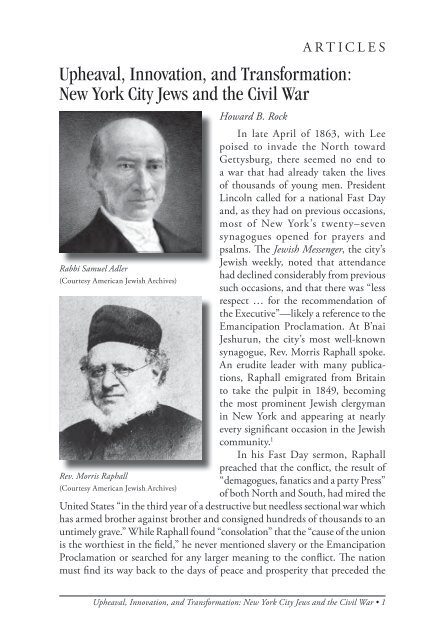American Jewish Archives Journal, Volume 64, Numbers 1 & 2
American Jewish Archives Journal, Volume 64, Numbers 1 & 2
American Jewish Archives Journal, Volume 64, Numbers 1 & 2
You also want an ePaper? Increase the reach of your titles
YUMPU automatically turns print PDFs into web optimized ePapers that Google loves.
ARTICLES<br />
Upheaval, Innovation, and Transformation:<br />
New York City Jews and the Civil War<br />
Howard B. Rock<br />
In late April of 1863, with Lee<br />
poised to invade the North toward<br />
Gettysburg, there seemed no end to<br />
a war that had already taken the lives<br />
of thousands of young men. President<br />
Lincoln called for a national Fast Day<br />
and, as they had on previous occasions,<br />
most of New York’s twenty–seven<br />
synagogues opened for prayers and<br />
psalms. The <strong>Jewish</strong> Messenger, the city’s<br />
<strong>Jewish</strong> weekly, noted that attendance<br />
had declined considerably from previous<br />
such occasions, and that there was “less<br />
respect … for the recommendation of<br />
the Executive”—likely a reference to the<br />
Emancipation Proclamation. At B’nai<br />
Jeshurun, the city’s most well-known<br />
synagogue, Rev. Morris Raphall spoke.<br />
An erudite leader with many publications,<br />
Raphall emigrated from Britain<br />
to take the pulpit in 1849, becoming<br />
the most prominent <strong>Jewish</strong> clergyman<br />
in New York and appearing at nearly<br />
every significant occasion in the <strong>Jewish</strong><br />
community. 1<br />
Rabbi Samuel Adler<br />
(Courtesy <strong>American</strong> <strong>Jewish</strong> <strong>Archives</strong>)<br />
In his Fast Day sermon, Raphall<br />
preached that the conflict, the result of<br />
Rev. Morris Raphall<br />
“demagogues, fanatics and a party Press”<br />
(Courtesy <strong>American</strong> <strong>Jewish</strong> <strong>Archives</strong>)<br />
of both North and South, had mired the<br />
United States “in the third year of a destructive but needless sectional war which<br />
has armed brother against brother and consigned hundreds of thousands to an<br />
untimely grave.” While Raphall found “consolation” that the “cause of the union<br />
is the worthiest in the field,” he never mentioned slavery or the Emancipation<br />
Proclamation or searched for any larger meaning to the conflict. The nation<br />
must find its way back to the days of peace and prosperity that preceded the<br />
Upheaval, Innovation, and Transformation: New York City Jews and the Civil War • 1
















